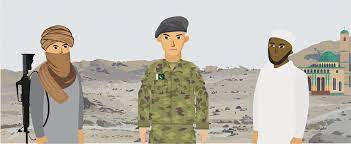Khadija Shar
Balochistan, a province in southwestern Pakistan, has been marred by a prolonged insurgency that has had a devastating impact on the lives of its people. While the insurgency often dominates headlines, it is crucial to shed light on the plight of innocent Balochistanis who have been caught in the crossfire. This article aims to highlight the human cost of the conflict and emphasize the need for attention, empathy, and sustainable solutions. The Human Cost: The insurgency in Balochistan has resulted in a significant loss of life and widespread human rights violations. According to various reports and human rights organizations, thousands of people, including civilians, security personnel, and militants, have lost their lives since the conflict’s escalation. The Baloch people, who primarily inhabit the province, have endured immense suffering. They have been subjected to forced disappearances, extrajudicial killings, torture, and arbitrary arrests, allegedly carried out by security forces and militant groups alike. The impact on families and communities has been profound, with countless individuals living in fear and uncertainty, unaware of the fate of their loved ones. Innocent Balochistanis Caught in the Crossfire: It is essential to recognize that the majority of Balochistan’s population consists of peaceful and law-abiding citizens who strive for a better future. These innocent Balochistanis, who are not involved in the insurgency, deserve attention and support as they bear the brunt of the conflict’s repercussions. Education and Development Challenges: The insurgency has had severe consequences for education and development in Balochistan. The violence has disrupted the education system, leading to the closure of schools and universities, depriving children and young adults of their right to education. Consequently, the literacy rate in Balochistan remains significantly lower than the national average, perpetuating socio-economic disparities and hindering the province’s progress. Additionally, the conflict has impeded infrastructure development and economic growth in the region. Basic amenities such as healthcare facilities, clean water, and electricity are inadequate or inaccessible to many Balochistanis, further exacerbating their challenges. Seeking Sustainable Solutions: Resolving the insurgency in Balochistan requires a multifaceted approach that addresses the underlying issues of grievances and marginalization. It is imperative for the Pakistani government to engage in open dialogue with all stakeholders, including Baloch nationalist groups, to find peaceful and inclusive solutions. Transparency and accountability are crucial. Investigations into human rights abuses must be conducted independently, ensuring that perpetrators are held accountable regardless of their affiliation. The protection of civilians’ rights and the provision of humanitarian assistance should be prioritized. Investments in education, healthcare, infrastructure, and economic opportunities are fundamental for the long-term development of Balochistan. By empowering the people and addressing their socio-economic needs, the government can foster a sense of belonging and create an environment conducive to peace and stability. Therefore the insurgency in Balochistan has inflicted immense suffering on the innocent Baloch people, who deserve attention, empathy, and sustainable solutions. It is incumbent upon the Pakistani government, civil society organizations, and the international community to prioritize the protection of human rights, promote dialogue, and invest in the province’s development. By addressing the root causes of the conflict and supporting the aspirations of Balochistanis, we can strive towards a peaceful and prosperous future for the region.

